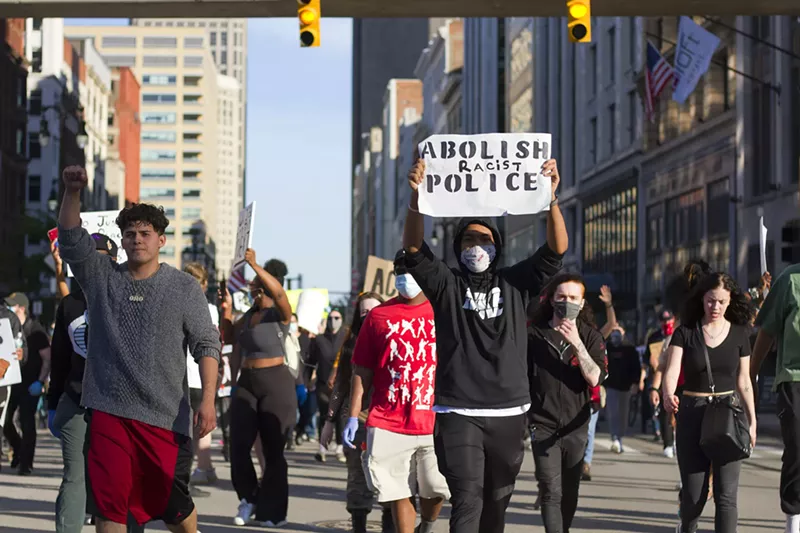
Steve Neavling
On Saturday, as Black Lives Matter protests erupted in Detroit and more than 140 cities across the country in response to the death of George Floyd at the hands of Minneapolis police, Mayor Mike Duggan called a press conference with several Black community leaders and activists to denounce the violence and call for peace. In a line that was repeated by officials in municipalities across the country, they blamed “outside agitators” for infiltrating the peaceful protests and escalating the conflict. In Detroit’s case, that meant white people from the surrounding suburbs.
Indeed, photos and video from the protests showed a diverse crowd, not reflective of Detroit’s majority-Black demographics. Detroit Police Chief James Craig said of the 60 arrests made for disorderly conduct on Friday night, only 23 were people from Detroit. The rest came from surrounding communities like Farmington Hills, West Bloomfield, Ann Arbor, Brighton, and even as far away as Bay City. A man who ripped the smashed window off of the police car was from Sterling Heights.
In a Sunday press conference, Craig said the number of arrests made on Saturday grew to 84. He continued to maintain that the majority of those arrested were people with out-of-town addresses; one came from Ohio, and another came from Tennessee.
“Maybe all of these people come from cities whose police departments are not in need of their voices and they felt they had to come down here,” Duggan said. “Or more likely they came here to damage property and to throw rocks and bottles at our police officers.”
Duggan’s claim is undermined, however, by the widely understood fact that many Detroiters use suburban addresses to avoid the city’s high tax and auto insurance rates.
I know this to be true anecdotally. For the past 12 years or so, I would say the majority of the millennials I know, both Black and white, use suburban addresses. Some grew up in Detroit and use the address of an aunt or other relative who lives in a neighboring community with cheaper rates. Some grew up in the suburbs and moved to Detroit, drawn by Detroit’s “comeback city” narrative, only to find they were better off financially keeping their parents’ address. These are people who live in Detroit, work in Detroit, and love Detroit, but couldn’t make it work otherwise. (And no, it’s not because they’re spending all their money on avocado toast; millennials really are fucked, hence, in part, these protests.)
And Duggan knows this too. Since 2015, the city has tried to crack down on residents who use suburban addresses. In 2017, it filed lawsuits against landlords saying it believed “many residents” living in the city were using the suburban address of a relative or friend “for purposes of obtaining lower auto insurance rates and/or the purpose of avoiding city income tax liability.” In 2018, the city even sued billionaire Dan Gilbert’s Bedrock real estate arm to compel it to release information on its tenants, many of them living in expensive apartments, for its investigation.
The point was made by protest organizer Tristan Taylor during Sunday’s demonstration, who said many of these people were drawn to Detroit after Duggan “roll[ed] the red carpet for white people.”
Protest organizer calls out @MayorMikeDuggan for blaming suburbanites for the unrest, while attracting them to the city with tax subsidies. pic.twitter.com/kYXRRDRl66
— Motor City Muckraker (@MCmuckraker) June 1, 2020
(And don’t forget that although Duggan was born in Detroit and graduated from Detroit Catholic Central High School, he lived in majority-white Livonia before moving back to the city in 2012 to run for mayor.)
At the press conference, the Black activists echoed Duggan’s sentiment. Community leader Ray Winans said he believed the arrests showed a double standard. “If any of our Black and brown boys from Detroit would’ve went to any of those suburbs and thrown bricks and rocks, I’m pretty sure we’d be a CNN world news story, because they probably would have been murdered,” he said. “We don’t need no outsiders coming in, disrupting our communities trying to tear up our stuff, because we can’t do that in West Bloomfield.”
Rev. Charles Williams II, president of the National Action Network, was even more blunt. “These outsiders put our community in harm’s way,” he said. “And I use the term ‘outsiders’ nicely. But really what I would like to say is that they’re no different than what we consider white supremacists.”
No doubt there could be some young white people drawn to Detroit’s protest to play out their Joker fantasies. Detroit has long been a place that has attracted white suburbanites to do things they couldn’t get away with in their own communities, whether it’s to paint graffiti or take ruin porn photos or get lit at Tigers opening day or Saint Patrick’s Day. But to paint with such a broad stroke by dismissing the movement as the product of a few privileged agents of chaos misses the very point of what the protests are about. For many people — Black and white and everything else, but especially Black — our society simply hasn’t been working for them.
Stay on top of Detroit news and views. Sign up for our weekly issue newsletter delivered each Wednesday.

